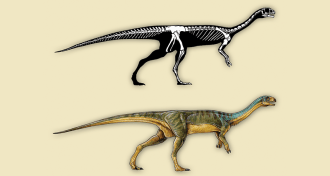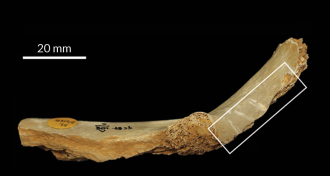News
-
 Earth
EarthStronger quakes could strike other segments of Nepal fault
The magnitude 7.8 earthquake that struck Nepal’s capital city could be overshadowed by larger future earthquakes along the Himalayas, scientists say.
-
 Earth
EarthHidden water found deep beneath Antarctica desert valley
New imaging reveals liquid water network beneath Antarctica’s McMurdo Dry Valleys that could support microbial life.
-
 Climate
ClimateWarming’s role in extreme weather quantified
Scientists calculate how much to blame human-driven climate change for extreme high temperatures and heavy rainfall.
By Beth Mole -
 Paleontology
Paleontology‘Frankenstein’ dinosaur was a mash-up of meat eater and plant eater
Fossils of a bizarre-looking dinosaur found in Chile are challenging ideas about how dinosaurs adapted to their environments.
-
 Anthropology
AnthropologyPots from hunter-gatherer site in China tell tale of lifestyle shift
Chinese foragers settled down and made pottery shortly before farming’s ascent.
By Bruce Bower -
 Anthropology
AnthropologyRitual cannibalism occurred in England 14,700 years ago
Human bones show signs of ritual cannibalism in England 14,700 years ago.
By Bruce Bower -
 Astronomy
AstronomyAstronomers celebrating Hubble’s past focus on its future
Astronomers celebrate the 25th anniversary of the Hubble Space Telescope by reflecting on its diversity and looking ahead to the future.
-
 Genetics
GeneticsGenetic editing can delete deleterious mitochondria
A new technique slates mutant mitochondria for destruction.
-
 Neuroscience
NeuroscienceCatching Zs may snag memories, too
Flies genetically destined to be forgetful could boost their memory with sleep.
-
 Animals
AnimalsBees may like neonicotinoids, but some may be harmed
Two high-profile tests raise worries that bees can’t avoid neonicotinoid pesticides and that wild species are at special risk.
By Susan Milius -
 Life
LifeBolder snails grow stronger shells
Bold snails have tougher shells than shy snails. Understanding what drives snails to develop such differences is a bit of a challenge.
-
 Environment
EnvironmentNatural acids in soil could protect rice from toxic nanoparticles
A common component of dirt makes toxic copper oxide nanoparticles less harmful to rice plants.
By Beth Mole